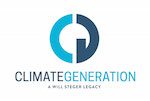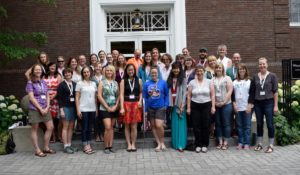By YES! Coordinator Katelyn Larsen
 Having attended the Climate Generation (CG) Summer Institute in 2015, I went in to the 2016 session with three goals in mind:
Having attended the Climate Generation (CG) Summer Institute in 2015, I went in to the 2016 session with three goals in mind:
- To network with Minnesota teachers and explain more about the YES! Program in hopes of creating more teams;
- To understand the Next Generation Science Standards and how they align with the YES! Program;
- And to gain tips on how to lead interactive sessions that I could take back to YES! for our events this year.
Looking back on the last week, I accomplished all of my goals. The 2016 CG Summer Institute for Climate Change Education intended for its participants to fully immerse themselves in climate change education through the lens of CG’s newest curriculum, Next Generation Climate, aligned largely to the Next Generation Science Standards (NGSS). While Minnesota won’t be able to adopt NGSS until 2018 or later, the curriculum is also aligned to The Essential Principles of Climate Literacy, Energy Literacy Principles, Minnesota Science Standards, Minnesota Social Studies Standards, and Minnesota English Language Arts Standards.
 Each day of the institute included lessons adapted from the Next Generation Climate curriculum, hands-on activities, keynote presentations from scientists like Dr. Benjamin Santer and Dr. Robert Jacobel, content breakout sessions, field trips, and time for personal and group reflection.
Each day of the institute included lessons adapted from the Next Generation Climate curriculum, hands-on activities, keynote presentations from scientists like Dr. Benjamin Santer and Dr. Robert Jacobel, content breakout sessions, field trips, and time for personal and group reflection.
My favorite highlight from the institute was learning about and engaging in citizen science on Day 3, which is part of Lesson 4 of the curriculum. We learned the importance of contributing data so that scientists can continue to study and learn about the Earth. We learned to identify trees through Project BudBurst, report bird sightings through Project FeederWatch and Celebrate Urban Birds, and report hail through CoCoRaHS Hail Report. There are a wealth of citizen science programs available with varying degrees of interests, time commitment, and difficulty. I’m excited to promote citizen science to YES! teams and encourage them to participate.
I’m excited to use the education I received to improve climate change education among the YES! community. If you’d like to learn more about Climate Generation or find out how to get involved in climate change education, visit http://www.climategen.org/
